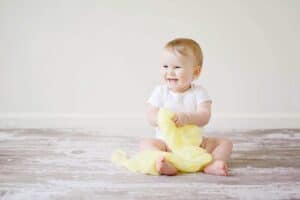A blocked nose is not only extremely annoying and unpleasant for a baby. Many adults also feel uncomfortable when the nasal mucous membranes are swollen. Nasal drops for the baby are sometimes quite helpful and also recommended. But caution is often called for.
This is because some nose drops contain special active ingredients that can endanger the child’s health. Depending on the product, the corresponding ingredients are sometimes dosed too high.
Table of contents
Nasal Drops For Babies Are Often Beneficial
The airways in babies are usually still so narrow and small that it is difficult for them to breathe through their noses, especially when they have a cold. If health is poor and babies are struggling with a cold, breathing through the mouth is usually very difficult.
Babies usually cannot breathe through their mouths yet. You should therefore make sure that your little one’s nose remains clear to ensure an optimal oxygen supply.
Most nasal drops for babies contain decongestants, such as oxymetazoline or the proven xylometazoline. Active substances of this type constrict the filigree blood vessels located in the nose.
Just a few seconds after administering the nasal drops to the baby, the nasal secretions can flow off more easily. This makes it easier for your little bundle of joy to breathe again.
Nasal Drops For The Baby Provide For More Well-Being
A blocked nose impairs breathing. In most cases, this leads to considerable problems falling asleep and staying asleep. The child becomes restless, whiny, and cries a lot. This causes the nasal mucous membranes to swell even more, and the secretion that is produced is even more difficult to drain.
Such symptoms not only affect the baby’s well-being, but such impaired health is also a considerable burden for moms and dads.
The Danger Of Nasal Drops For The Baby
If the dosage of nasal drops is too high for the baby, this can sometimes have striking consequences for the child’s health. You should consider the following before giving your child nasal drops.
If the active substances enter the bloodstream, they will also reach the brain. Often these substances are vasoconstrictors. As a consequence, the heart rate could be lowered:
- Some nasal drops have an anesthetic effect.
- Breathing sometimes slows down.
- Some nasal drops in babies cause coma-like symptoms due to slowed breathing and delayed oxygen supply.
Note:
Despite the risks to infant health, the administration of nasal drops to babies is considered safe. However, it is a fact that you should keep away from preparations containing xylometazoline for safety’s sake, as this active ingredient, in particular, has repeatedly come under criticism in the past.
Nasal drops for babies and children under the age of two usually contain a greatly reduced concentration of the decongestant. This usually amounts to only about 0.025 percent have.
Consult the pediatrician you trust and inform yourself intensively about the advantages and disadvantages of nasal drops for babies. You should also bear this in mind:
- You should never give your baby a nasal spray without first consulting a doctor.
- Do not give your baby nasal drops more than three times a day.
- Do not use nasal drops on your baby for longer than a week.
- Never use your own nasal spray for your baby’s nose.
- The concentration of active ingredients in nasal drops for adults is far too high for infants and young children and can be harmful to their health.
Promising Alternatives To Nasal Drops For The Baby
Instead of nasal drops for the baby, you can alternatively use a saline solution. Such products are either available in pharmacies or you can make them “on your own”.
Mix about one liter of lukewarm water with about 100 grams of sea salt. Put some of it into a small bottle. A pipette is also very useful for this purpose.
This Is How You Apply The Saline Solution Correctly:
Place your child comfortably on a soft surface or in his crib. It is best if he or she is in the supine position. Ask your partner, a sibling, or best friend to carefully hold the baby’s head so that it cannot move for a moment.
Then drip one to two drops of the saline solution into each nostril. It is important that your child remains in the supine position for about a minute so that the liquid also reaches the mucous membranes at the back of the throat.
Tip
Before administering the saline solution, talk your little darling through it and create a relaxed atmosphere. Because if the mood is tense anyway, your baby will also tense up inside.
If he starts crying because he feels uncomfortable, the saline solution will easily run out of the small nostrils again. This means that a decongestant effect on the nasal mucous membranes cannot be guaranteed.
Breast milk has also been shown to help babies breathe easier when their nasal mucous membranes are swollen. Breast milk, for example, contains valuable active ingredients that have an antiseptic effect on the one hand and an anti-inflammatory and calming effect on the other.
These aspects consequently have a positive influence on swollen nasal mucous membranes. Simply put a few drops of your breast milk into your child’s nose with the help of a pipette. Hold his little head for a short time until the milk has completely run into the nostrils.
Good To Know
Whether it’s a nasal spray, nasal drops, saline solution, or breast milk, it’s not just the decongestant effect that’s essential to improve a baby’s breathing when he has a cold. It is equally relevant that the mucous membranes remain well moistened.
This is because dry mucous membranes can crack more easily and cause additional discomfort. Because of the cracking, a larger surface area is formed, where bacteria, germs, and other pathogens could settle more easily and further affect health.
Nasal Aspirators – The Annoying Little Helpers
In pharmacies and drugstores, nasal aspirators are offered, which are quite useful for infants with a cold. With such a nasal aspirator you can free the nose from the secretion that accumulates in the nostrils due to the cold.
This nasal secretion impairs breathing and makes the baby uncomfortable. With a nasal aspirator, you can provide relief in just a few simple steps.
The Correct Use:
Before you hold the opening of the nasal aspirator in your baby’s first nostril, you should press the flexible rubber or silicone container together with your thumb and index finger.
In this way, you hold the nasal aspirator in the little nose and then gently lift the thumb and forefinger. The resulting suction removes the nasal secretions and your little darling can breathe easier again.
Children usually find this procedure extremely unpleasant and annoying. In fact, it is not particularly pleasant for adults either to feel such a “foreign body” in their nose.
Nevertheless, the use of a nasal aspirator can provide relief. At the same time, nasal spray, which you then drip into the nose freed from secretion, can flow in more easily and have a more targeted effect.
By The Way
A proven home remedy as an alternative to nasal drops is water vapor. While adults usually rely on using an inhaler or holding their head over a container of hot steam, this is rather suboptimal for babies.
However, you can sit down with your bundle of joy in front of the shower cubicle in the bathroom and put the water on. The resulting steam will penetrate the baby’s tiny nostrils and moisten them. After a while, the child will feel some relief.
Even grandmother once used angelica balm to clear the nose of her charge. However, infants under three months of age should not come into contact with the essential oils of the balm.
Instead, you can put a small dab of the ointment or balm on a cloth. Drape it near the baby’s head in the baby’s crib. Make sure that the child cannot grab the cloth with its hands.
Conclusion
A cold, accompanied by coughing and discomfort in the baby is certainly nothing unusual. Many parents are afraid to buy nasal drops for their babies.
The modern preparations that you can buy today in pharmacies and drugstores are indeed characterized by their high dose of active ingredients. In this respect, caution is advised. The best thing to do is to contact your pediatrician and ask him to prescribe nasal drops for your baby.
Instead of chemical nasal drops, you can make a saline solution yourself and try to relieve your child’s breathing problems with it. If you use a nasal aspirator beforehand, the drops will work even better.
Sources
https://www.hallo-eltern.de/baby/nasentropfen-baby/
https://www.hebammenblog.de/erkaeltungszeit-was-tun-wenn-dein-baby-die-nase-voll-hat/










